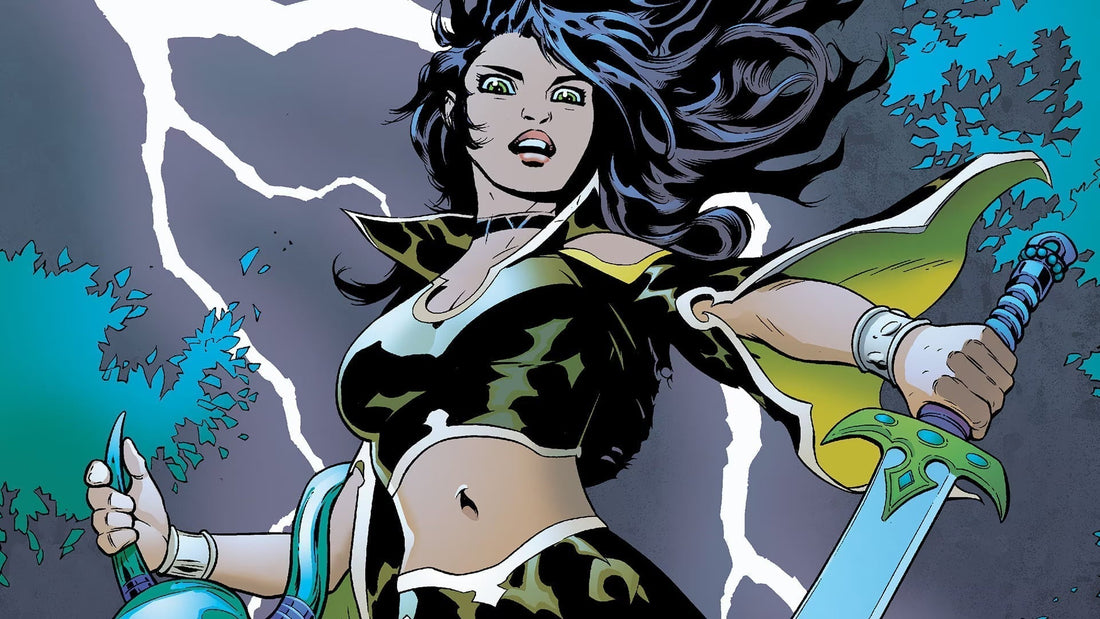
Talia al Ghul: History, Role in the League of Assassins and Connection to Batman
Talia al Ghul: Between family loyalty and forbidden love
A complex and compelling character in the Batman universe, Talia al Ghul is more than just an antagonist. The daughter of Ra's al Ghul , she grew up in the League of Assassins , fueled by a worldview where only purification through force seems possible. Yet her sincere love for Bruce Wayne will challenge her beliefs, creating a character torn between legacy and emotion.
First appearing in 1971's Detective Comics #411 , Talia has since become one of the most iconic and ambivalent female figures in the Bat-Family. Part lover, part enemy, she is central to many of the Bat-Family's most notable plots, including that of their son, Damian Wayne .
But how can we explain the complexity of this woman, who is at once a formidable strategist, a protective mother, and a passionate lover? A dive into a character on the brink of light and darkness.
A childhood in the shadow of the League
Talia al Ghul is the only daughter of Ra's al Ghul, immortal leader of the League of Assassins. From a young age, she was trained in martial arts, military strategy, science, and the League's philosophy. She excels in all areas, becoming the perfect heir.
Her father destined her to lead the League alongside the man he deemed worthy of his successor: Bruce Wayne. For Ra's, their union represents the perfect blend of power, intelligence, and ideology. But while Talia admires Batman, she doesn't always adhere to his moral vision of justice, setting the stage for a conflict that is both personal and global.
This duality is brilliantly explored in several story arcs, notably Son of the Demon and Batman Incorporated , where Talia becomes the leader of the terrorist group Leviathan, in direct opposition to Bruce. She is neither completely good nor fundamentally evil: she acts according to a logic where feelings and ambitions collide.
Want to explore other characters connected to the League? Check out our full article on Batman and the League of Assassins or delves into the legacy of Batgirl , another powerful female figure in Gotham.
Between loyalty and betrayal: his complex relationship with Batman
What makes Talia al Ghul so fascinating is her ambivalent bond with Bruce Wayne. Between true love, loyalty to her father, and strategic manipulation, the demon's daughter is a multifaceted character, always torn between two worlds. She is both an unexpected ally and a formidable foe.
Their relationship is born of mutual admiration. Talia respects Batman's moral strength, while Bruce recognizes her as an intelligent, courageous… and terribly attractive opponent. This chemistry creates a dynamic that is as passionate as it is toxic.

The different facets of their bond
- A Dangerous Love : Talia is one of the few women who truly understands Bruce Wayne. But her love is often conditioned by her obligations to the League of Assassins.
- An ambivalent mother : Their union produces Damian Wayne, a child raised in violence and the cult of the warrior elite. She imposes her vision on her son, even if it means opposing Batman.
- A brilliant manipulator : She uses her charms and strategy to try to get Batman to succeed Ra's al Ghul, even if it means betraying her feelings.
- A formidable rival : When their ideologies clash, she becomes a ruthless adversary, leading the League with formidable composure.
This duality makes her a key character in the Dark Knight mythology. Rarely has an antagonist been so close to the hero's heart, without denying her mission or family loyalty.
Talia in comics, movies, and video games
Talia al Ghul isn't just a supporting character in the Batman universe; she's a central figure in numerous story arcs, appearing in comics as well as animated, film, and video game adaptations. Each medium offers a different facet, further enriching her complexity.
In the comics: a charismatic and feared heiress
Created by Dennis O'Neil and Bob Brown, Talia first appeared in 1971's Detective Comics #411 . She quickly became a recurring character in the plots of Ra's al Ghul, the League of Assassins, and the fate of Bruce Wayne.
- Batman: Son of the Demon (1987): Features their union and the birth of Damian.
- Batman Incorporated (Grant Morrison): Talia becomes one of the main antagonists, ready to do anything to impose her vision of the world.
- Death and the Maidens : she even opposes her father, showing a powerful desire for emancipation.
At the cinema: a revelation in The Dark Knight Rises
In Christopher Nolan's The Dark Knight Rises (2012), Talia is played by Marion Cotillard. Under the name Miranda Tate, she poses as an ally of Bruce Wayne before revealing her true identity in the film's final acts.
- His dual identity reinforces the dramatic impact of the film, and his attachment to his father remains the driving force behind his choices.
- This version, although criticized for its rapid development, remains faithful to the spirit of the character: a calculating, strategic and determined woman.
In video games: an outstanding fighter
The Batman: Arkham saga gives Talia a prominent role. In Arkham City , she is an ambiguous supporter of Batman, and her final sacrifice leaves a strong emotional imprint.
- His mastery of martial arts is highlighted in cutscenes and dialogue.
- She once again embodies this constant duality between sincere love and loyalty to the League.
Want to explore these different versions of Talia? Dive into our article on the complete Batman movie timeline , or discover the visually brutal world of the Arkham Asylum saga, where Talia plays a major role in the shadows.
Conclusion: Talia al Ghul, between heritage and free will
Talia al Ghul is much more than just a supporting role in the Batman universe. Heir to a secret empire, brilliant strategist, relentless fighter, mother of Damian Wayne, and tragic lover of Bruce, she embodies all of Gotham's contradictions: love and hate, justice and revenge, loyalty and betrayal. Her destiny is constantly redefined, driven by her often heartbreaking choices.
By following her, we also discover another side of the Dark Knight: that of the man behind the mask, confronted with his deepest emotions, his most complex moral dilemmas. Talia embodies this gray area so characteristic of the Batman universe, where heroes can fail, and enemies can love.
